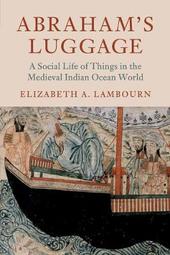
|
Abraham's Luggage: A Social Life of Things in the Medieval Indian Ocean World
Paperback / softback
Main Details
| Title |
Abraham's Luggage: A Social Life of Things in the Medieval Indian Ocean World
|
| Authors and Contributors |
By (author) Elizabeth A. Lambourn
|
| Series | Asian Connections |
|---|
| Physical Properties |
| Format:Paperback / softback | | Pages:317 | | Dimensions(mm): Height 229,Width 152 |
|
| Category/Genre | Asian and Middle Eastern history |
|---|
| ISBN/Barcode |
9781316626276
|
| Classifications | Dewey:382.091824 |
|---|
| Audience | | Professional & Vocational | |
|---|
| Illustrations |
2 Tables, black and white; 2 Maps; 9 Halftones, black and white
|
|
Publishing Details |
| Publisher |
Cambridge University Press
|
| Imprint |
Cambridge University Press
|
| Publication Date |
13 June 2019 |
| Publication Country |
United Kingdom
|
Description
From a single merchant's list of baggage begins a history that explores the dynamic world of medieval Indian Ocean exchanges. This fresh and innovative perspective on Jewish merchant activity shows how this list was a component of broader trade connections that developed between the Islamic Mediterranean and South Asia in the Middle Ages. Drawing on a close reading of this unique twelfth-century document, found in the Cairo Genizah and written in India by North African merchant Abraham Ben Yiju, Lambourn focuses on the domestic material culture and foods that structured the daily life of such India traders, on land and at sea. This is an exploration of the motivations and difficulties of maintaining homes away from home, and the compromises that inevitably ensued. Abraham's Luggage demonstrates the potential for writing challenging new histories in the accidental survival of apparently ordinary ephemera.
Author Biography
Elizabeth A. Lambourn is a historian of South Asia and the Indian Ocean world, specializing in cultural exchanges with the Middle East before 1500. She is Reader (Associate Professor) in South Asian and Indian Ocean Studies at De Montfort University, Leicester.
Reviews'Transforming a twelfth-century list into a history of the stuff of life, Lambourn brilliantly demonstrates how Southern India was linked to the Middle East. From the production of food to the maintenance of purity, and even staying watered and well on the journey itself, this is exemplary Indian Ocean history.' Michael Laffan, Princeton University, New Jersey 'Abraham's Luggage opens a fascinating window onto a world of interconnected Indic, Islamic, and Jewish traditions in the medieval Indian Ocean. From cultures of dining, gifting, medicine, packing, and religious ritual to mercantile shopping habits and shipping, the book is awash with original insights. Its holistic approach offers a compelling and innovative model of interdisciplinary scholarship.' Finbarr Barry Flood, Institute of Fine Arts and founder-director of Silsila: Center for Material Histories, New York University 'Lambourn's deeply learned and intellectually enterprising reconstruction of the biology and materiality of travel along the maritime highways of the western Indian Ocean enriches our understanding of how humans have inhabited ships and the high seas in a crucial period of world history.' Roxani Eleni Margariti, Emory University, Georgia 'Elizabeth A. Lambourn brings to life the trip home to Egypt of a twelfth-century Jewish trader, transforming a Geniza fragment into a mirror of macrohistory and reconstructing the life of a Mediterranean household in India. A fascinating, path-breaking study for Geniza research and the history of material culture in the Indian Ocean.' Mordechai Akiva Friedman, Tel-Aviv University, Israel '... Lambourn's book is an ethnography of an 800-year-old cultural world, but its human feel makes it unlike any previous work about the region and period.' Erik Gilbert, Journal of Interdisciplinary History '... Abraham's Luggage is flawlessly produced and well thought out, with hyperlinks enabling quick cross-referencing of chapter endnotes, references to other chapters in the volume and figures and tables. Abraham's Luggage will no doubt inspire much of that work and makes a powerful contribution in its own right.' Rebecca Darley, Journal of Early Modern History
|